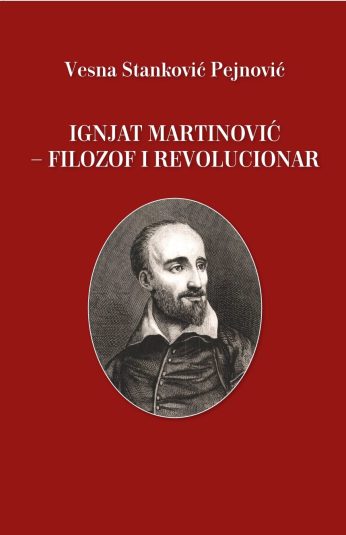IGNJAT MARTINOVIĆ – FILOZOF I REVOLUCIONAR
Abstract
Stanković Pejnović, Vesna. 2024. Ignjat Martinović – filozof i revolucionar. Beograd: Institut za političke studije. ISBN 978-86-7419-398-3
The monograph Ignjat Martinović – philosopher and revolutionary, Dr. Vesna Stanković Pejnović, depicts the society and an exceptional individual who shaped his thoughts according to the ideals of the Enlightenment and the progress of society and the reforms that were needed to achieve this. At the beginning of his journey, Ignjat Martinović wanted to contribute to society through the educational structure. Under Joseph’s reign, the crown sought to reform higher education at the major universities in a bid to use the universities as a means of centralizing the empire and improving administrations. For this, the emperor needed professors who spread social, moral and economic approaches that corresponded to the politics of the dynasty.
The monograph shows that historical events cannot be viewed in black and white and that the philosophical and political thoughts and actions of each person arise from his upbringing, circumstances that shaped him, ideals that together with events form a complex whole of human life. Dismissing a special individual just because he was a Freemason or elevating a very critical idealistic revolutionary just because some of his ideas seem interesting to us can divert the identification of historical events and the perception of causes and consequences that are the result of various influences.
A significant contribution offered by the author’s monograph is a presentation of the complex research of one individual through a multidisciplinary presentation. It gives an account of a time and the position of individuals through a historical, philosophical, sociological and legal perspective, trying to bring closer the “spirit” of the time and the individual who was guided by the spirit of the time and ideas.
When all his works, his ideals, his way of life, his records, his reports that he wrote to the emperors and the court administration, and historiographical researches are taken into account, the author gives an account of the development of his ideas, their danger to the state and his perseverance in them, which it cost him his life. From today’s way of observing reality, it is not possible to make a moral judgment about an individual, event or time. Martinović is an “enlightenment” product of his time because in his life he had everything that his time brought: priestly upbringing, enlightenment ideas, connection of “Illyrian” regions, citizenship in the making, erudite education, connection of ideas that spread through Europe through acquaintances and availability literature, an anti-theistic mentality that did not prevent him from associating with Catholic and Orthodox dignitaries such as Bishop Maksimilian Vrhovec and Bishop Stratimirović. He was driven by the desire to implement reformist ideas in turbulent social events and reduce the influence of the high nobility and clergy on the politics of the monarchy. Martinović and his collaborators advocated for the freedom and rights of man and for the abolition of feudal privileges. All of the above is just an example of the complexity of time and life, a complexity that requires study because every time, every event, every prominent man finds his place in history, even though his actions may have different interpretations, since the perspectives are different.
The reflection of the actions of the intellectual, philosopher Ignjat Martinović, as an advocate of radical enlightenment, shows the retreat of enlightened absolutism and the trap that the enlightener fell into with the belief that the change of society can be carried out through the ruler, so from the emperor’s adviser he becomes a conspirator against the state.
The monograph is a tribute to a philosopher and revolutionary, but it can also be read as a criticism of a society that “prepared” the trap into which the former adviser of the emperor fell.

